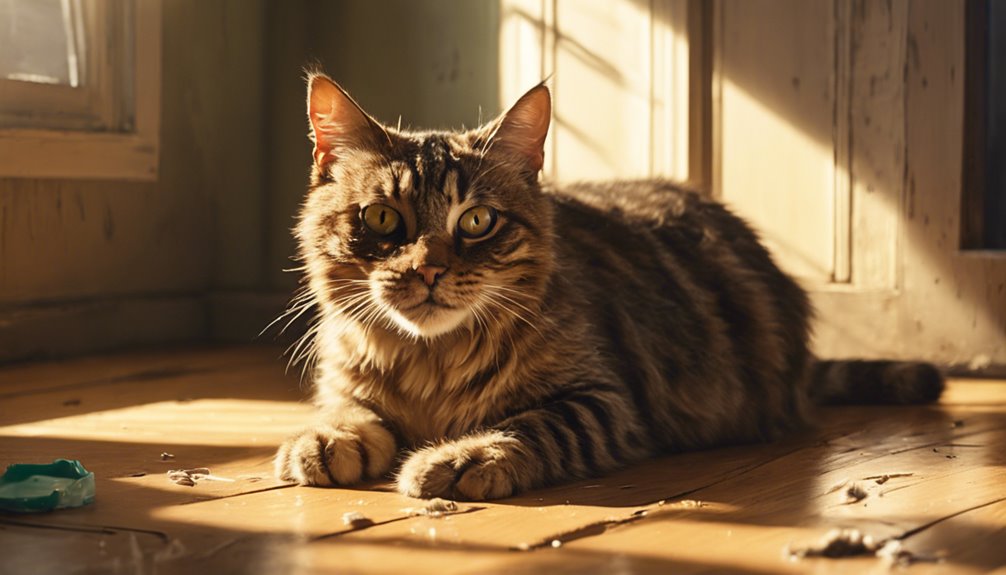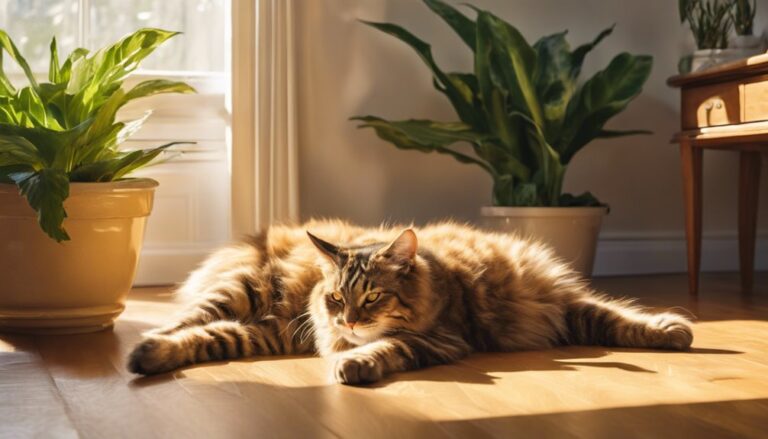If your male cat is pooping on the floor, there could be several reasons. Health issues, like urinary tract infections or gastrointestinal problems, might make him avoid the litter box. Also, stress from changes in the environment or new pets can trigger this behavior. It's important to assess his litter box setup, including location and type of litter, as these factors can influence his comfort. Age-related changes might also play a role. Observing patterns and identifying triggers can guide you to solutions. Exploring these aspects will help you understand his behavior better and improve his litter habits.
Health Issues to Consider
When you notice your male cat pooping on the floor, it's important to contemplate potential health issues that could be the underlying cause. Urinary tract infections can lead to discomfort, prompting your cat to avoid the litter box. Similarly, gastrointestinal problems, including diarrhea or constipation, may result in your cat's aversion to using the box. Stress or changes in diet can exacerbate these conditions, making it essential to observe any other behavioral changes. If your cat's litter box habits change suddenly, it's wise to consult your veterinarian. Early diagnosis can prevent more serious complications, ensuring your cat's health and well-being. Addressing these health concerns promptly is significant for maintaining your pet's comfort and happiness.
Litter Box Preferences
If health issues have been ruled out, your male cat's litter box preferences could be influencing his behavior. Addressing these preferences can help guarantee your cat feels comfortable and secure when using the litter box. Consider the following factors:
- Litter Box Location: Place the box in a quiet, low-traffic area where your cat can feel safe.
- Litter Type: Experiment with different types of litter (clumping, non-clumping, scented, unscented) to find what your cat prefers.
- Box Size: Confirm the litter box is large enough for your cat to turn around comfortably.
- Number of Boxes: Ideally, have one litter box per cat, plus one extra, to prevent territorial disputes.
These adjustments can greatly enhance your cat's litter box experience.
Stress and Anxiety Factors
Understanding your male cat's stress and anxiety factors is vital, as these emotional states can greatly impact his behavior, including inappropriate elimination. Environmental changes, such as moving to a new home or introducing new pets, can create significant stress for your cat. These shifts may trigger anxiety, leading him to seek out alternative places to relieve himself. Additionally, certain behavioral triggers, like loud noises or changes in your routine, can heighten his stress levels. It's essential to identify these factors and observe how they affect your cat's mood and habits. By minimizing environmental stressors and addressing behavioral triggers, you can help create a calmer environment that encourages appropriate litter box use and promotes your cat's overall well-being.
Territorial Behavior
Although it might seem surprising, territorial behavior in male cats can greatly influence their elimination habits. When your cat feels the need to assert dominance or claim territory, it may resort to pooping outside the litter box as a form of territorial marking. Understanding the behavioral triggers behind this can help you address the issue effectively. Here are some common triggers:
- New pets: The introduction of another animal can provoke insecurity.
- Moving: Relocating can make your cat feel unsettled in their territory.
- Changes in routine: Disruptions in daily activities can cause stress.
- Fights with other cats: Encounters with rival cats can lead to marking behaviors.
Identifying these triggers can be key to resolving your cat's inappropriate elimination.
Age-Related Changes
As your male cat ages, you may notice behavioral changes that can affect his litter box habits. Senior cats often experience health issues that can lead to accidents, and their litter box preferences may shift as well. Understanding these age-related changes is essential for addressing the problem effectively.
Senior Cat Behavior
When cats reach their senior years, they often undergo various behavioral changes that can impact their litter box habits. Understanding these changes is essential for maintaining a harmonious environment. Here are some common behavioral changes you might notice:
- Altered Communication: Senior cats may communicate differently, becoming more vocal or withdrawn.
- Litter Box Preferences: They might prefer specific types of litter or box styles, impacting their willingness to use it.
- Routine Disruption: Changes in daily routines can cause stress, leading to accidents outside the litter box.
- Increased Sensitivity: Older cats may be more sensitive to their surroundings, which can affect their comfort level when using the litter box.
Being aware of these senior cat communication trends can help you adapt to their needs and improve their quality of life.
Health Issues Overview
Understanding the health issues that arise with age is crucial for any cat owner, especially since these changes can greatly affect your male cat's litter box habits. As your cat ages, he may become more susceptible to kidney disease, which can lead to increased urination and discomfort. This discomfort might cause him to avoid the litter box altogether. Additionally, intestinal parasites can become a concern, especially if his immune system weakens. These parasites can cause digestive issues, leading to accidents outside the litter box. Regular veterinary check-ups are essential for early detection and management of these health problems. By staying informed, you can help maintain your cat's quality of life and guarantee he remains comfortable and healthy as he ages.
Litter Box Preferences
While many cat owners may not realize it, a male cat's litter box preferences can change considerably as he ages. As your cat matures, his needs regarding litter box cleanliness and location may shift, impacting his bathroom habits. Here are four key considerations:
- Litter Box Cleanliness: Older cats may become more sensitive to unclean litter boxes. Regular scooping is vital.
- Litter Box Location: Verify the box is easily accessible, as mobility can decline with age.
- Litter Type: Some senior cats may prefer softer or different types of litter due to comfort.
- Number of Boxes: Increasing the number of litter boxes may help prevent accidents, accommodating your cat's changing preferences.
Being attentive to these factors can help maintain your cat's comfort and hygiene.
Diet and Digestion
If your male cat is pooping on the floor, one potential factor could be related to his diet and digestion. Dietary changes can greatly impact your cat's digestive health. Cats thrive on a balanced diet rich in protein and low in fillers. If you've recently switched his food, it may not agree with him, leading to gastrointestinal upset. Look for signs like diarrhea or vomiting, which indicate digestive distress. Additionally, make sure he's drinking enough water, as dehydration can worsen digestion. Gradually introducing new foods helps minimize digestive issues. Pay attention to ingredient quality; lower-quality ingredients can lead to poor digestion. Consult your veterinarian if the problem persists, as they can offer tailored advice for improving his diet and overall digestive health.
Previous Negative Experiences
Changes in diet can sometimes lead to digestive issues, but other factors might be at play as well. Your male cat may have developed negative associations with the litter box due to past trauma. This can manifest in inappropriate elimination behaviors. Understanding these experiences is essential for addressing the issue. Consider the following:
- Previous litter box changes – A new type or location may confuse him.
- Stressful events – Moves, new pets, or changes in routine can trigger anxiety.
- Negative reinforcement – Punishment for accidents can lead to fear and avoidance.
- Medical issues – Illness or pain can result in aversion to the litter box.
Recognizing these factors can help you create a safer, more comfortable environment for your cat.
Frequently Asked Questions
Could My Cat Be Marking Territory in My Home?
Did you know that around 10% of cats exhibit territorial behavior? If your cat's pooping outside the litter box, it could be a form of scent marking. Male cats, in particular, may feel the need to assert their territory, especially if they sense competition from other animals. This behavior can stem from stress or changes in their environment. Identifying the triggers can help you address this issue effectively, ensuring a harmonious home.
How Can I Tell if My Cat Is Stressed?
To tell if your cat's stressed, look for behavioral signs like hiding, excessive grooming, or aggression. Changes in appetite or litter box habits can also indicate stress. Consider any recent environmental changes, such as new pets, moving, or changes in routine. These factors can impact your cat's comfort levels. Pay attention to their body language, as ears back or a tucked tail often signal anxiety. Addressing these issues can help your cat feel more secure.
Does My Cat's Breed Affect Its Litter Box Habits?
Yes, your cat's breed can influence its litter box preferences. Certain breeds have specific characteristics that may affect their habits. For example, Siamese cats might be more particular about cleanliness, while Maine Coons may adapt more easily. Understanding these breed characteristics can help you create a litter box setup that meets your cat's needs, ensuring a more positive experience. Consider factors like litter texture and box size to encourage proper use.
Are Male Cats More Prone to Litter Box Issues?
Are male cats more prone to litter box issues? While it can vary, male behavior often influences litter box preferences. Neutered males generally face fewer problems, but intact males might exhibit territorial marking, leading to litter box avoidance. Factors like stress, health issues, or litter type can also affect their habits. It's essential to monitor your cat's behavior and guarantee their environment is comfortable to maintain proper litter box use.
What Should I Do if My Cat Refuses to Use the Litter Box?
If your cat's refusing to use the litter box, start by exploring litter box alternatives like different types of litter or boxes. Some cats prefer covered boxes, while others like uncovered ones. Make sure the box is clean; use effective cleaning methods to eliminate odors that might deter your cat. Also, consider any changes in your cat's environment that could be causing stress. Patience and observation are key to resolving this issue.




